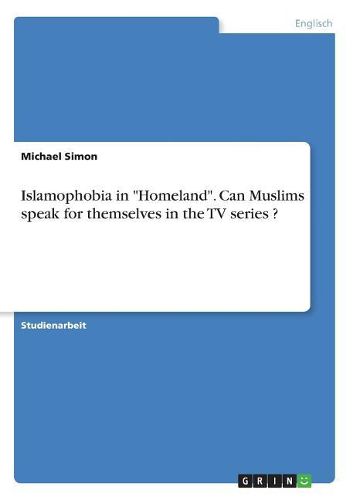Readings Newsletter
Become a Readings Member to make your shopping experience even easier.
Sign in or sign up for free!
You’re not far away from qualifying for FREE standard shipping within Australia
You’ve qualified for FREE standard shipping within Australia
The cart is loading…






Studienarbeit aus dem Jahr 2017 im Fachbereich Amerikanistik - Kultur und Landeskunde, Note: 1,7, Friedrich-Alexander-Universitaet Erlangen-Nuernberg (Institut fuer Anglistik und Amerikanistik), Veranstaltung: US Empire Studies, Sprache: Deutsch, Abstract: In fall of 2011, many critics celebrated Homeland as the best show of the season. One year later, similar reviews could be read. But since the pilot of the first season of the show, voices of strong disapproval mixed with the applause. These voices did not just criticize some logic errors in the story writing or sloppy acting (justifiably or not) but brought up a serious accusation: Homeland displaying islamophobic representations. As an example, Laila Al-Arian states that the show has the "insidious implication that Muslims, no matter how successful, well-placed and integrated, are a hidden danger to their fellow Americans". I would like to analyze and explore the hints and underlying premises of the show on whether or not islamophobic tendencies and representations can be discovered and, if so, to which extend. Why is it important to ask these questions? In an article, The Guardian foreign affairs editor Peter Beaumont describes the way "'the other' - those whom we fear or are suspicious of -" is depicted in popular films and TV shows can reinforce "cultures of conflict" because "[p]opular culture both informs and echoes our prejudices". The show claims to be close to reality and tries to showcase this for example by putting 9/11 witness footage and real politicians such as President Clinton, President Obama (who himself is a fan of the show) or Commander Colin Powell into the opening credits, which is an attempt to convey credibility and authenticity to the viewer. But that exactly is why it is important to consider how religious groups, minorities or ethnicities are represented. Popular culture is capable of reinforcing images and prejudices, and a show like Homeland that tries to appear credible to his viewe
$9.00 standard shipping within Australia
FREE standard shipping within Australia for orders over $100.00
Express & International shipping calculated at checkout
Studienarbeit aus dem Jahr 2017 im Fachbereich Amerikanistik - Kultur und Landeskunde, Note: 1,7, Friedrich-Alexander-Universitaet Erlangen-Nuernberg (Institut fuer Anglistik und Amerikanistik), Veranstaltung: US Empire Studies, Sprache: Deutsch, Abstract: In fall of 2011, many critics celebrated Homeland as the best show of the season. One year later, similar reviews could be read. But since the pilot of the first season of the show, voices of strong disapproval mixed with the applause. These voices did not just criticize some logic errors in the story writing or sloppy acting (justifiably or not) but brought up a serious accusation: Homeland displaying islamophobic representations. As an example, Laila Al-Arian states that the show has the "insidious implication that Muslims, no matter how successful, well-placed and integrated, are a hidden danger to their fellow Americans". I would like to analyze and explore the hints and underlying premises of the show on whether or not islamophobic tendencies and representations can be discovered and, if so, to which extend. Why is it important to ask these questions? In an article, The Guardian foreign affairs editor Peter Beaumont describes the way "'the other' - those whom we fear or are suspicious of -" is depicted in popular films and TV shows can reinforce "cultures of conflict" because "[p]opular culture both informs and echoes our prejudices". The show claims to be close to reality and tries to showcase this for example by putting 9/11 witness footage and real politicians such as President Clinton, President Obama (who himself is a fan of the show) or Commander Colin Powell into the opening credits, which is an attempt to convey credibility and authenticity to the viewer. But that exactly is why it is important to consider how religious groups, minorities or ethnicities are represented. Popular culture is capable of reinforcing images and prejudices, and a show like Homeland that tries to appear credible to his viewe